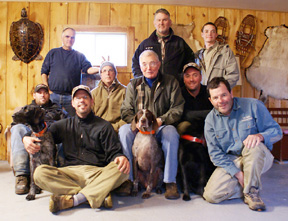
Chesapeake Bay's Independent Newspaper ~ Since 1993
1629 Forest Drive, Annapolis, MD 21403 • 410-626-9888
Volume XVII, Issue 44 ~ October 29 - November 4, 2009
Home \\ Correspondence \\ from the Editor \\ Submit a Letter \\ Classifieds \\ Contact Us
Dining Guide \\ Home & Garden Guide \\ Archives \\ Distribution Locations \\ Advertising
![]()

 |
Fish Are BitingBreaking rockfish and bluefish are all over the Bay. Follow the birds. Trolling and deep jigging around the Bay Bridge and the rock piles work well for stripers and some big white perch. Down south around Breezy Point, lots of bigger striped bass up to 36 inches are being taken by trollers following the birds from the Radar Towers to Parker’s Creek. |
Upland Hunting in Nova Scotia
Bird, buck and bear abound, for shooting by gun or camera
The small, long-billed bird burst up, dodging around and through the tangles of alder branches. Hurriedly shouldering my 20-gauge, I shot just as the woodcock banked behind a spruce tree. Score one more for the woodcock. It was a clean miss.
A few minutes later a rocketing grouse, having startled me with a thunderous flush, pulled a similar maneuver but at a much higher speed. My shot had much the same result, except that I was probably a foot farther behind that one.
My son Harrison and I plus five friends had traveled to Nova Scotia for its upland bird hunting, and we were finding the birds in spades outside Brookfield on the fourth-generation working farm of David Kennedy, his wife Linda and son Danny.
The true measure of any upland bird hunt is measured in flushes, not game in hand. By that standard we were in hunting heaven.
Beyond grouse and woodcock, we encountered Wilson’s snipe, ringneck pheasants and a few ducks. I was glad we had brought plenty of shells. It was, to borrow a military phrase, a target-rich environment.
|
|
![]() Dense stands of spruce and alder, ideal cover for most of these birds, flourish well in the wet, boggy ground that is plentiful along the many brooks and rivers in Nova Scotia. There are also hawthorn bushes, thick and adorned with nutritious red berries and three-inch-long needle-sharp stickers.
Dense stands of spruce and alder, ideal cover for most of these birds, flourish well in the wet, boggy ground that is plentiful along the many brooks and rivers in Nova Scotia. There are also hawthorn bushes, thick and adorned with nutritious red berries and three-inch-long needle-sharp stickers.
The terrain is littered with vast numbers of storm-downed trees. All of this varied forest growth provides food and protects game from predators and the elements. But it’s the very devil to traverse.
We referred to one of our more exhausting days in a particularly thick, tangled and bird-abundant covert as The Death March at Hell’s Cove. For this hunt, being in good physical condition is hardly optional.
Near the end of our week-long hunt, three of our party — Mike Kelly, Sean Fitzpatrick and Andy Hughs — borrowed the Kennedys’ well-equipped kitchen to prepare dinner from our bag of game. Kelly Caulk, Doug Ternan, my son and I lent moral support.
Platters of deliciously rendered woodcock, grouse, snipe, pheasant and duck graced a table that was also laden with steaming potatoes, cabbage, carrots, tomatoes and onions fresh from our host’s farm. It was the highlight of our trip to the North Country.
Highlights of Stewiacke Valley
Nova Scotia is sparsely settled. Particularly in the large wet areas preferred by these birds, it is home to much other game, and Dave has come to know all of it over his many years of guiding in the Canadian provinces.
A powerfully built, bushy-browed outdoorsman and farmer, Dave is the direct descendant of the first Stewiacke Valley settler, William Kennedy, who arrived in Nova Scotia from Ireland some 220 years ago.
Black bear and whitetail deer are Dave’s particular sporting passions, and many record bears and bucks have been taken by the men and women he has guided over the years.
He has also recently begun hosting photographic safaris, particularly in the big, wild northern forests that are home to an incredible number of large and beautiful animals. The Bay of Fundy is also nearby with its 16-foot tides (Chesapeake tides are normally less than two feet), a bonus for nature lovers and photographers alike.
Guests are accommodated in a large, rustic hunt cabin on the family’s farm. Outings are eminently affordable, with good, down-home cooking included at the Kennedys’ nearby restaurant from food organically grown on their farm.
For a true wild Canadian maritime experience, reach Dave or Linda at 902-673-2023 or 902-673-2578.
Conservation Alert
Maryland Department of Natural Resources’ Commercial and Recreational Fishing Advisory Commissions met recently over concerns by the commercial sector that pre-season catch-and-release sport fishing was harming rockfish spawning success. A number of recommendations were made to reduce the frequency and impact of this increasingly popular activity.
Missing from the discussion was the impact on spawning by the rockfish commercial gill net season that runs through the end of February. Tons of egg-laden female rockfish are harvested at this time every year from the Chesapeake and sent off to the New York markets — with a profound effect on the spring spawn. Maryland conservationists should be outraged at this double standard of natural resources oversight.
© COPYRIGHT 2009 by New Bay Enterprises, Inc. All rights reserved.
